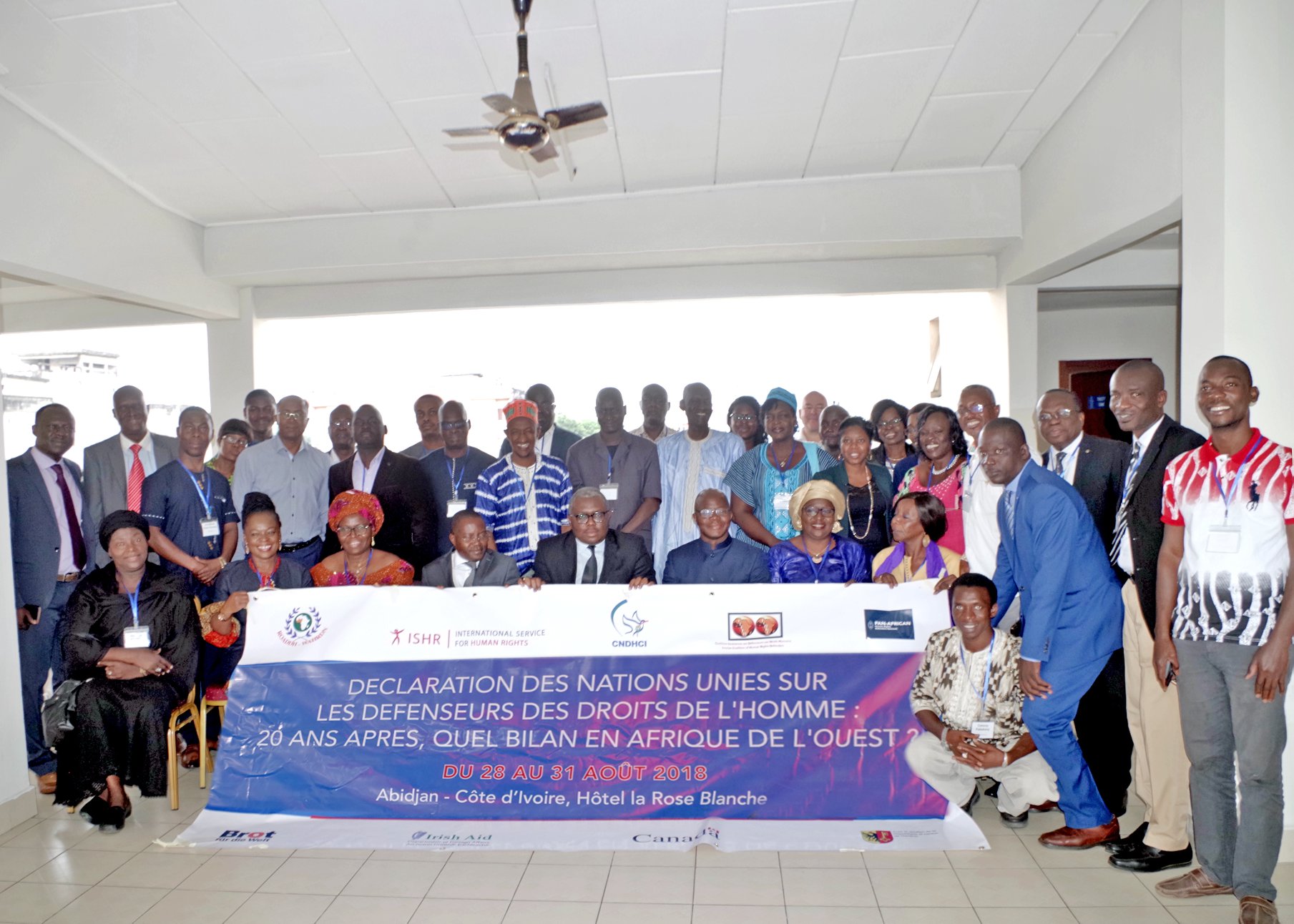From 28 to 31 August, ISHR organised a seminar in collaboration with the West African Human Rights Defenders Network (WAHRDN), the Ivorian Coalition of Human Rights Defenders (CIDDH), the Pan African Human Rights Defenders Network and HRCnet. The aim of the seminar was to draw an assessment of the Declaration’s impact on human rights defenders, twenty years after its adoption.
Over 35 defenders attended coming from all over West Africa. They shared facts and views about the status of protection for human rights defenders in their respective countries, the remaining challenges, gaps and ways to guarantee full implementation of the Declaration.
The first day focused on the assessment of national protection in the countries where laws have been adopted, and in those where the process has started. Defenders from Côte d’Ivoire had the opportunity to meet with the African Commission on Human and Peoples’ Rights (ACHPR)’ Special Rapporteur on defenders, Remy Ngoy Lumbu, to evaluate the impact of the national protection law and to discuss ways to make the implementation mechanisms effective and efficient. Defenders also met him privately to share more specific concerns. ‘I assure you that, through my mandate, I will work to provide all the support of the African Commission on Human and Peoples’ Rights so that the daily work of human rights defenders is protected by a legal framework,’ the Special Rapporteur declared.
‘The defenders’ protection law was adopted in Côte d’Ivoire after a long crisis, which took the lives of hundreds. This was a very important step to promote and protect those who risk their lives to protect those of others’ said the Vice-president of Côte d’Ivoire’s National Human Rights Commission, Traoré Wodjo Fini, during the opening ceremony.
On the second day, defenders explored and developed strategic plans to advocate at the UN as well as the African Commission in order to advance the protection of defenders through the implementation of the Declaration in their country. This last session was preceded by a video from the UN Special Rapporteur on human rights defenders who shared lessons learned from his experience as a Special Rapporteur and especially the need to change the narrative about human rights defenders, so that governments and other stakeholders don’t see them as a threat but rather as actors of democracy and development.
On the third day, members of the WAHRDN reflected on their structure and work until now and discussed ways to improve the network for a better protection of defenders, especially those facing particular risks, in the sub-region. A special focus was given to the protection of women human rights defenders who were able to meet privately with the ACHPR Special Rapporteur. During this discussion, women human rights defenders highlighted the need for States to take into consideration the gender perspective when drafting national defenders laws.
‘Women human rights defenders working on extractive industries and human rights are particularly at risk in the sub-region. It is crucial that States take the necessary measures and implement recommendations from the study on the situation of women human rights defenders in Africa,’ said Mélanie Kombate, West Africa Human Rights Defenders Network Coordinator.
On the fourth and last day, participants designed strategies on how to engage with the UN Human Rights Council to further protect the rights of defenders in their country, and more largely in the region. By the end of the seminar, participants adopted a declaration including recommendations for the governments of West African countries, and an action plan with steps to guarantee the implementation of the Declaration in the next 20 years.
‘Our efforts must continue so that in twenty years, in spite of emerging challenges, more countries will have adopted national protection laws in the region’ concluded Clément Voulé, ISHR Senior Advisor.
Contact: [email protected] Adélaïde Etong Kame, Africa Advocacy Consultant
Photo: CIDDH




